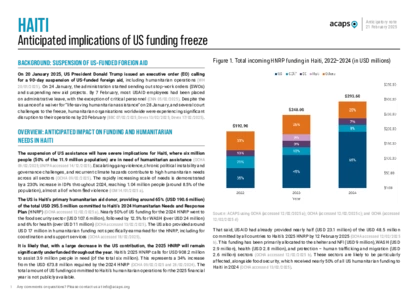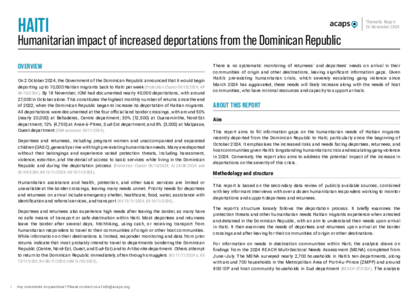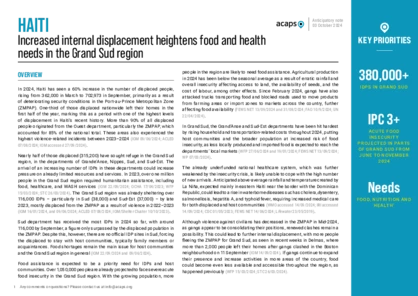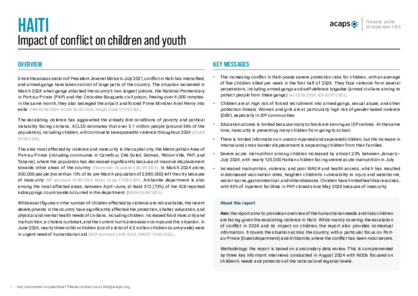Latest updates on country situation
15 April 2025
Between March–June 2025, 5.7 million people in Haiti are projected to face acute food insecurity – Crisis (IPC Phase 3) or worse – including 8,400 experiencing Catastrophe (IPC Phase 5). The number of people facing acute food insecurity has increased by 15% compared to the same period in 2024. This deterioration is primarily because of rising gang violence in the Metropolitan Area of Port-au-Prince, triggering a spike in displacement, with over one million people displaced by December. High inflation and limited humanitarian aid, worsened by the US funding cuts, are also worsening the situation. Forced displacement leads to the loss of livelihood opportunities, both informal and formal, increasing unemployment and reducing households’ financial access to food. Low agricultural production, linked to poorly modernised systems in rural areas, remains largely insufficient to meet the country’s food needs. Almost half of Haiti’s population, especially IDPs, needs emergency food assistance. (IPC 14/04/2025, IOM 14/01/2025, ECHO accessed 15/04/2025)
25 March 2025
Between mid-February and mid-March 2025, criminal violence in Haiti’s capital, Port-au-Prince, displaced over 60,000 people, aggravating an already dire humanitarian situation. Since 11 March alone, more than 23,000 people have been displaced by gang attacks in several neighbourhoods of the capital, including Carrefour-Feuilles, Bas-Peu-de-Chose, Avenue Christophe, Bois-Verna, and Morne-à-Tuf. 88% of these newly displaced people have taken refuge in displacement sites, while others are with host families.
Many people have been displaced multiple times, experiencing livelihood losses, limited access to services, and psychological trauma, leading to increased dependence on humanitarian aid. The newly displaced urgently require humanitarian assistance to access shelter, food, healthcare, and protection – the main providers of which also face reduced US humanitarian aid, limiting their ability to deliver and potentially worsening the conditions of those in need. (IOM 21/02/2025, IOM 18/03/2025, OCHA 21/03/2025)
28 January 2025
The number of IDPs in Haiti tripled from 315,000 in 2023 to 1,041,299 in December 2024. The largest increase was recorded in Artibonite and Nord-Est departments, at 90% and 115%, respectively. Port-au-Prince continues to be the main source of IDPs as a result of the gang violence in the city since early 2024. Ouest department, where Port-au-Prince is located, is where the largest number of displaced people are concentrated, with 39% of the total number of IDPs residing in or around the capital. IDPs in general may face limited access to essential services, such as healthcare, especially for those who have left the capital, where most services are concentrated. The response in areas such as Artibonite and Nord-Est is more limited, with health centres facing severe staff shortages, limited capacity, and disease outbreaks. (IOM 14/01/2025, MDM 09/12/2024, OCHA 05/04/2024)
30 December 2024
Gangs attacked two health centres in Port-au-Prince between 17–24 December, leaving four dead and 15 injured and damaging one of the country's most specialised health facilities: the Bernard Mevs hospital, Haiti’s only neurological trauma centre. The upsurge in gang violence in Port-au-Prince since February 2024 has caused the closure of over 30 health centres in Port-au-Prince and almost half of the health centres across the country. A shortage of essential supplies caused by the closure of ports and airports, coupled with the constant fear of attacks on healthcare professionals, has made it more difficult for the population to access these services. (El País 30/12/2024, UN 28/06/2024, MSF 21/05/2024, ICRC 10/09/2024)
09 December 2024
Criminal violence in Haiti surged on 7–8 December with the killing of 180 people by a local gang in Cité Soleil, a neighbourhood in Port-au-Prince. The fighting displaced around 5,000 people from the neighbourhoods of Christ Roi Moïse, Fort National, and Poste Marchand. Civilians need access to protection services. (IOM 09/12/2024, BBC 09/12/2024, Al Jazeera 09/12/2024)
08 December 2024
Severe flooding and heavy rainfall in northern and southern Haiti have affected over 100,000 people nationwide since early December. One of the hardest-hit areas is Cap-Haïtien, the main city north of the country, accounting for 70% of the affected population. An environmental emergency was declared in the city following a landslide on 5 December, which buried homes in mud and killed at least four people. Les Cayes and Port-Salut, in the Sud department, are also among the most impacted. The affected populations urgently need food kits, drinking water, and emergency WASH services. (ERCC accessed 10/12/2024, OCHA 06/12/2024, Haitian Times 09/12/2024)
05 November 2024
Since 2021, 437,000 people have been forcibly returned to Haiti. Most (87%) have been returned from the Dominican Republic, Haiti’s only land-bordering neighbour. In 2024 alone, the Dominican Republic returned over 150,000 Haitians (97% of all returnees) and announced plans to send back 10,000 more weekly. This wave of returnees comes amid escalating insecurity, limited access to food and healthcare, and rising internal displacement in Haiti. Many returnees, nearly half of whom were self-employed when they left, may face insecurity and its impacts and struggle to secure jobs. The influx is also likely to put more pressure on host communities' capacity to support those in need, particularly in places such as Grand Sud region and Ouest department, where most of the displaced are settling. (IOM accessed 05/11/2024, IOM 22/09/2024, IOM 12/05/2024)
current crises
in
Haiti
These crises have been identified through the INFORM Severity Index, a tool for measuring and comparing the severity of humanitarian crises globally.
HTI001 - Complex crisis
Last updated 31/03/2025
Drivers
Violence
Socio-political
Other seasonal event
Crisis level
Country
Severity level
4.4 Very High
Access constraints
3.0
Analysis products
on
Haiti
21 February 2025
Haiti: Anticipated implications of US funding freeze
DOCUMENT / PDF / 1 MB
The suspension of US assistance will have severe implications for Haiti, where six million people (50% of the 11.9 million population) are in need of humanitarian assistance.
Attached resources
26 November 2024
Haiti: Humanitarian impact of increased deportations from the Dominican Republic
DOCUMENT / PDF / 876 KB
This report aims to fill information gaps on the humanitarian needs of Haitian migrants recently deported from the Dominican Republic to Haiti, particularly since the beginning of October 2024.
Attached resources
03 October 2024
Haiti: Increased internal displacement heightens food and health needs in the Grand Sud region
DOCUMENT / PDF / 996 KB
In 2024, Haiti has seen a 60% increase in the number of displaced people, rising from 362,000 in March to 702,973 in September, primarily as a result of deteriorating security conditions in the Port-au-Prince Metropolitan Zone (ZMPAP).
30 September 2024
Haiti: impact of conflict on children and youth
DOCUMENT / PDF / 1 MB
This report aims to provide an overview of the humanitarian needs and risks children are facing given the escalating violence in Haiti. While mainly covering the escalation of conflict in 2024 and its impact on children, the report also provides contextual information.
Attached resources
05 July 2024
Impact of hurricane Beryl
DOCUMENT / PDF / 374 KB
On 1 July, Hurricane Beryl made landfall in southern Windward Island, becoming the earliest Category 5 Atlantic Basin hurricane on record. By
4 July, its impact had killed ten people across the Caribbean. Some of the most affected islands are Carriacou and Petite Martinique in Grenada, with 95% of houses damaged.






